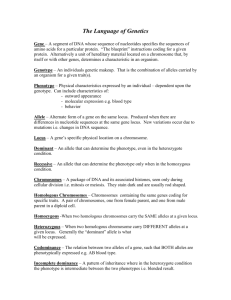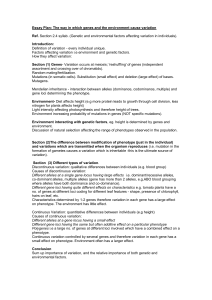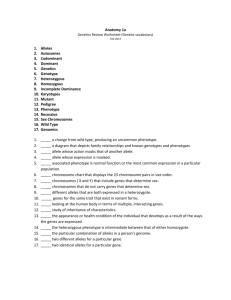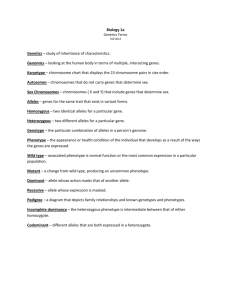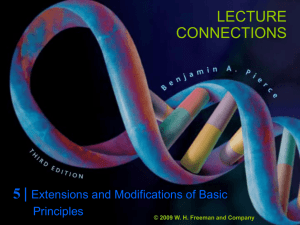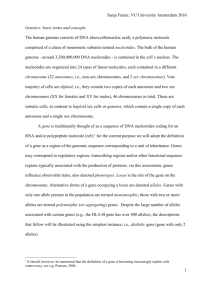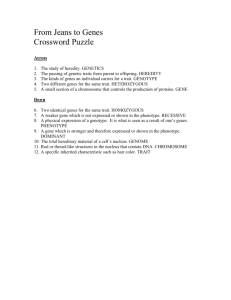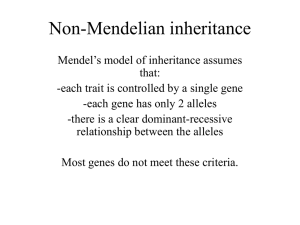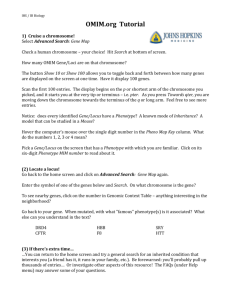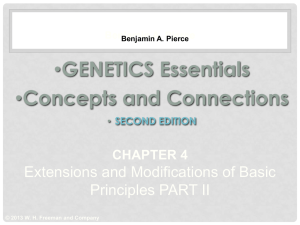9/04 Modifications of Mendel
advertisement
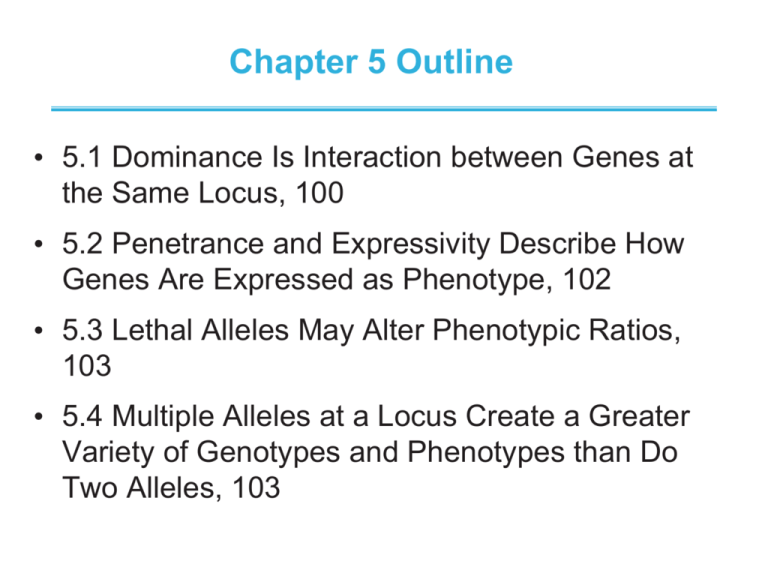
Chapter 5 Outline • 5.1 Dominance Is Interaction between Genes at the Same Locus, 100 • 5.2 Penetrance and Expressivity Describe How Genes Are Expressed as Phenotype, 102 • 5.3 Lethal Alleles May Alter Phenotypic Ratios, 103 • 5.4 Multiple Alleles at a Locus Create a Greater Variety of Genotypes and Phenotypes than Do Two Alleles, 103 Chapter 5 Outline • 5.5 Gene Interaction Occurs When Genes at Multiple Loci Determine a Single Phenotype, 105 • 5.6 Sex Influences the Inheritance and Expression of Genes in a Variety of Ways, 114 • 5.7 Anticipation Is the Stronger or Earlier Expression of Traits in Succeeding Generations, 122 • 5.8 The Expression of a Genotype May Be Influenced by Environmental Effects, 122 5.1 Dominance Is Interaction between Genes at the Same Locus • Genes at the same locus – two versions of the same gene; each version of the same gene is defined as allele. 5.1 Dominance Is Interaction between Genes at the Same Locus • Incomplete dominance • Codominance 5.2 Penetrance and Expressivity Describe How Genes Are Expressed as Phenotype • Penetrance: percentage of individuals having a particular genotype that express the expected phenotype • Expressivity: the degree to which a character is expressed 5.3 Lethal Alleles May Alter Phenotypic Ratios • A lethal allele: causes death at an early stage of development, and so some genotypes may not appear among the progeny More than 2 alleles at a locus •Relationship between allele pairs determines outcome •Could be exhibited as dominant/recessive relationship as in duck feathers •Could be exhibited in codominance as in ABO blood type 5.4 Multiple Alleles at a Locus Create a Greater Variety of Genotypes and Phenotypes than Do Two Alleles • ABO blood group 5.5 Gene Interaction Occurs When Genes at Multiple Loci Determine a Single Phenotype • Gene interaction: Effects of genes at one locus depend on the presence of genes at other loci. • Gene interaction that produces novel phenotypes 5.5 Gene Interaction Occurs When Genes at Multiple Loci Determine a Single Phenotype • Gene interaction with epistasis • Epistasis: One gene masks the effect of another gene. • Recessive epistasis 5.5 Gene Interaction Occurs When Genes at Multiple Loci Determine a Single Phenotype • Dominant epistasis 5.5 Gene Interaction Occurs When Genes at Multiple Loci Determine a Single Phenotype • Duplicate recessive epistasis 5.5 Gene Interaction Occurs When Genes at Multiple Loci Determine a Single Phenotype • Complementation: determines whether mutations are at the same locus or at different loci • The complex genetics of coat color in dogs: • Agouti (A) locus • Black (B) locus • Extension (E) locus • Spotting (S) locus 5.6 Sex Influences the Inheritance and Expression of Genes in a Variety of Ways • Sex-influenced and sex-limited characteristics Sex-influenced and sex-limited characteristics • Sex-influenced characteristics Sex-influenced and sex-limited characteristics • Sex-limited characteristics Sex-influenced and sex-limited characteristics • Cytoplasmic inheritance Sex-influenced and sex-limited characteristics • Genetic maternal effect Sex-influenced and sex-limited characteristics • Genomic imprinting: differential expression of genetic material depending on whether it is inherited from the male or female parent • Epigenetics: phenomena due to alterations to DNA that do not include changes in the base sequence; often affects the way in which the DNA sequences are expressed 5.7 Anticipation Is the Stronger or Earlier Expression of Traits in Succeeding Generations • Anticipation: A genetic trait becomes more strongly expressed or is expressed at an earlier stage as it is passed from generation to generation. 5.8 The Expression of a Genotype May Be Influenced by Environmental Effects • Temperature-sensitive allele: an allele whose product is functional only at a certain temperature
